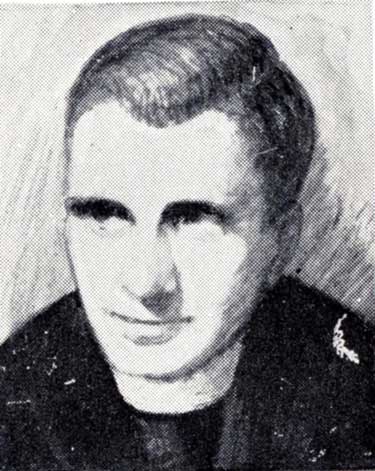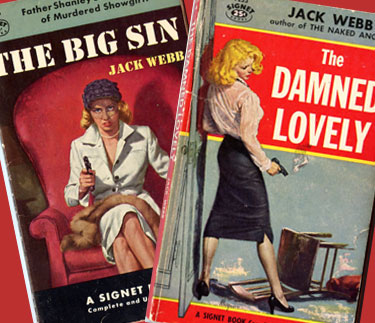CULTURE
The Other Jack Webb and His Crimebusting Priest
July 24, 2017
Around 1918, two guys named John Webb were born in Southern California. Both were nicknamed "Jack." John Randolph Webb served as an altar boy. In his 20s, he became a radio show producer and actor. The triumphs of this Jack Webb's fascination with police work and desire to educate the public about law enforcement and firefighter paramedics were Dragnet, Adam-12 and Emergency.
The other Jack Webb, John Alfred, worked as a zookeeper and technical writer before becoming an author of crime fiction and westerns. Some of his tales were published in hardcover, but most were offered as mass-market paperbacks.
"[Fr. Shanley was] created at a time when the Catholic Church was a cultural and market force that could not be ignored. Moreover it commanded acknowledgement and positive depiction."
A cheap book format that became popular in the 1940s, paperbacks in their golden age, including the early works of Flannery O'Connor, had cover illustrations that suggested sex, often combined with violence i.e., a woman holding a gun with one hand and her blouse together with the other.
Paperbacks were initially sold in drug and grocery stores because book stores would not handle them.
Between the seamy, soft covers was printed author Jack Webb's hard-boiled adventures of Catholic priest, Fr. Joseph Shanley and his partner in crimesolving, police Detective-sergeant Sammy Golden, an unobservant Jew.
Fr. Shanley and Golden debuted in 1952 in The Big Sin. The hardcover version was a selection of the Thomas More Book Club. Clearly a book titled The Big Sin was intended to capitalize on the actor Jack Webb's Dragnet, then a hugely successful radio program. Dragnet's stories were always called "The Big [Something or Other]."
The big sin is taking one's life. One of Fr. Shanley's parishioners, Rosa, a showgirl, is found dead with apparent indications that she killed herself. As the pastor of Rosa and her large, devout family, Shanley refuses to believe that Rosa was so "weak and cowardly" that she would commit suicide, an act that is "an absolute contradiction to everything the Christian religion teaches us as an end and object of Christian life."
Unlike some Catholics these days who write cop shows with Catholic characters, the obscure Jack Webb knew something about his faith.
On top of Rosa's alleged self-destruction being so out of character, she, if she really is a suicide, cannot be given Catholic funeral rites (as canon law prohibited in the 1950s) and be buried in consecrated ground. This only amplifies Fr. Shanley's distress and that of her family. Thus Fr. Shanley approaches Detective-sergeant Golden determined to prove that what appears to be suicide is actually murder.
At first Golden is skeptical, but at Shanley's urging, the unobservant Jew commits a little act of faith. Events quickly suggest that Fr. Shanley is on to something, that Rosa's death is not a case to be closed.

Cover artist's depiction of Fr. Joseph Shanley features him with a nose distorted in the boxing ring.
Shanley's role in the nine novels concerning his and Sammy Golden's adventures is to protect and advocate victims, mostly women. In their pursuit of truth and justice, the priest and policeman suffer excruciation in the form of corrupt superiors leaning on them on up to getting beaten (mostly Fr. Shanley's department), being shot at and stabbed. Having learned how to box at "Loyola" (which of the three isn't indicated), the priest further developed his pugilistic skills as a U.S. Navy chaplain in World War II. Where fisticuffs are called for, Father usually holds his own.
In addition to violence, Webb's tales have the other hallmarks of mid 20th-century hard-boiled, noire detective fiction: settings in nightclubs, sexy descriptions of bodies, metaphors such as:
"His face was familiar in the same way the king of diamonds is when you're away from a deck of cards."
"...his brogue was as thick as the soles of his service oxfords."
"...where oil, politics and five-card stud were as much one thing as the hairs in the hide of a fat hyena..."
In short, J.A. Webb was no G.K. Chesterton and his Fr. Shanley is no Fr. Brown. If you had to choose which you'd have on the proverbial desert island, by all means prefer Chesterton's plain little priest from Cobhole in Essex. The cheaply-made, sixty-plus-year-old Fr. Shanley paperbacks are all browned and falling apart anyway.
If not a character of great storytelling and if not in the front row, Fr. Shanley stands with Fr. Brown, the unnamed "whisky priest" of Graham Greene's The Power and the Glory, the fathers of Evelyn Waugh's Brideshead Revisited, Fr. Chisholm of A. J. Cronin's The Keys of The Kingdom, Fr. Chuck O'Malley, wonderfully played by Bing Crosby in the films Going My Way and The Bells of St. Mary's.
All these well-known or obscure characters and their stories were created at a time when the Catholic Church was a cultural and market force that could not be ignored. Moreover it commanded acknowledgement and positive depiction.(1)
The church was a powerful cultural force in the mid 20th century because it was a strong church. Catholics married Catholics, populated society with children and sent those kids to Catholic schools. Not all Catholics of the 1940s and '50s read Brideshead Revisited, but many more than in the 2000s had an interest in stories concerning their faith. Some Catholic readers became Catholic writers. Some writers even became Catholics. Most importantly of all, back in those days Catholics rooted for the Catholic team.
Little-known author Jack Webb's Fr. Shanley stories of the 1950s are evidence that the influence of a strong Catholic church can extend even to such things as bookracks laden with cheap, popular fiction.
Endnotes
(1)There is no historical or biographical reason for a priest to serve as a minor character in the 1957 film telling of Charles Lindbergh's trans-Atlantic flight, The Spirit of St. Louis, yet there is Fr. Hussman, present as a nod to the prominence of Catholics and their church in civil society.
For Further Reading
Neal J. Conway, My First Antiquarian And The Manly Art of Poetry
About Neal J. Conway



